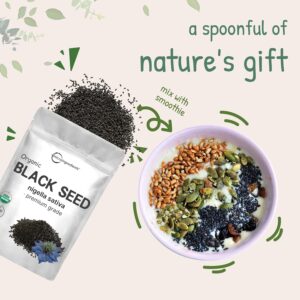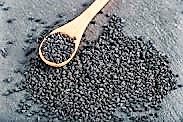Unveiling the Power of Black Seed, The Ultimate Guide to its Health Benefits and Uses Part-2
Black Seed, Medicinal plant, Antioxidants, Anti-inflammatory, Antimicrobial, Antidiabetic, Immunomodulatory, Skin health, Black Cumin, Nigella sativa, Health Benefits, Medicinal Properties, Klounji
5. From Skin to Hair, Unlocking its Beauty Benefits
When it comes to unlocking beauty benefits, black seed proves to be a remarkable natural ingredient that can work wonders for your skin and hair. From ancient times to the present day, black seed, scientifically known as Nigella sativa, has been celebrated for its potential to enhance beauty. Let’s explore how this seed can contribute to your skincare and haircare routine, helping you achieve healthier, more radiant skin and luscious locks.

- Nourishing the Skin: Rich in essential fatty acids, such as omega-3 and omega-6, which are crucial for maintaining healthy skin. These fatty acids help to strengthen the skin’s natural barrier, locking in moisture and preventing dehydration. Regular use of black seed-based products or incorporating black seed oil into your skincare routine can help nourish and hydrate your skin, leaving it supple and radiant.
- Antioxidant Powerhouse: The antioxidant properties of this seed make it an excellent ingredient for combating oxidative stress and protecting the skin against free radical damage. Antioxidants help neutralize harmful molecules that can lead to premature ageing, dullness, and wrinkles. Regular use of black seed-infused products can help maintain a youthful appearance and promote a healthy, glowing complexion.
- Soothing and Calming: Black seed possesses anti-inflammatory properties that can help calm and soothe various skin conditions. It may be beneficial for those dealing with issues like acne, eczema, or psoriasis. The anti-inflammatory compounds in the black seed can help reduce redness, swelling, and irritation, promoting a more balanced and comfortable complexion.
- Hair Strengthening and Growth: Black seed is known to have nourishing and strengthening effects on hair. Its rich nutrient profile, including essential fatty acids, vitamins, and minerals, helps promote healthy hair growth and combat hair loss. Incorporating black seed oil into your haircare routine or using hair products infused with black seed can contribute to stronger, thicker, and more lustrous hair.
- Scalp Health: A healthy scalp is essential for maintaining beautiful hair. Black seed’s antimicrobial and anti-inflammatory properties can help maintain a balanced scalp environment, reducing issues like dandruff and itchiness. By promoting scalp health, black seed encourages optimal conditions for hair growth and overall hair health.
- Revitalizing and Repairing: Its potent properties can revitalize and repair damaged skin and hair. Whether it’s addressing signs of ageing, dryness, or environmental damage, these seed’s rejuvenating effects can help restore vitality and promote a healthier appearance.
When incorporating black seed into your beauty routine, you can find various products such as facial serums, moisturizers, hair oils, or masks that feature black seed as a key ingredient. Alternatively, you can opt for using pure black seed oil directly on your skin or hair for a more targeted approach.
However, it’s important to note that individual experiences may vary, and it is always recommended to patch-test any new product or consult with a dermatologist before incorporating black seed or any new ingredient into your skincare or haircare routine.
In conclusion, these seed’s beauty benefits are truly remarkable. Its nourishing, antioxidant, and soothing properties make it a versatile ingredient for both skin and hair care. By unlocking the potential of the black seed, you can embrace its natural goodness and enhance your beauty routine for healthier, more vibrant skin and hair.
6. Black Seed Oil, The Versatile Elixir for Holistic Wellness
Black seed oil, often referred to as a versatile elixir, has gained significant recognition in recent years for its potential to support holistic wellness. Derived from the seeds of the Nigella sativa plant, black seed oil has a long history of traditional use and is believed to offer a wide range of health benefits. Let’s explore the versatility of its oil and its potential to contribute to overall well-being.

- Nutritional Powerhouse: This oil is packed with essential nutrients, including healthy fats like omega-3 and omega-6 fatty acids, which are vital for supporting heart health, brain function, and overall wellness. Additionally, it contains vitamins (such as vitamins A, vitamin E, and B vitamins) and minerals (such as iron, calcium, and potassium), making it a nutrient-dense supplement.
- Immune System Support: The oil is renowned for its potential to enhance immune function. It contains bioactive compounds, including thymoquinone, that have been studied for their immune-boosting properties. Regular consumption of black seed oil may help modulate immune responses, strengthen immune cells, and promote a healthy inflammatory response.
- Digestive Health Aid: This oil has been traditionally used to support digestive wellness. Its anti-inflammatory properties may help soothe the digestive tract and alleviate symptoms of gastrointestinal discomfort. Additionally, black seed oil’s antioxidant compounds can contribute to a healthy gut environment by neutralizing harmful free radicals.
- Respiratory Wellness: The seed oil may have a positive impact on respiratory health. It has been used to address respiratory conditions, such as asthma, bronchitis, and allergies. Its anti-inflammatory and bronchodilatory effects may help alleviate symptoms and promote clearer breathing.
- Skin and Hair Benefits: Black seed oil offers potential benefits for skin and hair health. Its moisturizing and nourishing properties can help hydrate the skin, promote a healthy complexion, and alleviate dryness. When applied to the hair and scalp, oil may contribute to stronger, shinier hair and a balanced scalp environment.
- Antioxidant and Anti-inflammatory Effects: The antioxidant and anti-inflammatory properties of these seed oils make them a valuable supplement for combating oxidative stress and reducing inflammation in the body. By neutralizing free radicals and modulating inflammatory responses, black seed oil may help promote overall wellness and protect against chronic diseases.

https://amzn.to/3w4sXDU
When incorporating seed oil into your routine, it’s essential to choose a high-quality, cold-pressed oil from a reputable source. The recommended dosage and usage may vary, so it’s advisable to consult with a healthcare professional before adding black seed oil to your wellness regimen, especially if you have any specific health conditions or are taking medications.
In short, black seed oil stands out as a versatile elixir that can support holistic wellness. Its nutritional profile, immune-boosting properties, digestive support, respiratory benefits, and potential effects on skin and hair health make it a valuable addition to a well-rounded approach to overall well-being. By harnessing the potential of black seed oil, you can embrace its versatility and enhance your journey toward holistic wellness.
7. Potential Side Effects
While it is generally considered safe for most people when consumed in moderation, it’s important to be aware of potential side effects that may occur in certain individuals. Here are some possible side effects associated with black seed:
- Allergic Reactions: Some individuals may experience allergic reactions to them. Symptoms can include skin rashes, itching, swelling, or difficulty breathing. If you are allergic to plants in the Ranunculaceae family, such as buttercups or daisies, it’s advisable to avoid black seed or consult with a healthcare professional before use.

- Gastrointestinal Distress: In some cases, black seed consumption may lead to gastrointestinal side effects, such as stomach upset, nausea, or diarrhoea. This is more likely to occur when consumed in large amounts or if you have a sensitive stomach.
- Low Blood Pressure: These seeds have been reported to have a mild hypotensive effect, which means they may lower blood pressure. If you have low blood pressure or are taking medications to lower your blood pressure, it’s important to monitor your levels and consult with a healthcare professional before using black seed.
- Interaction with Medications: They may interact with certain medications. It can potentially affect the liver’s ability to metabolize medications, leading to increased or decreased drug levels in the body. If you are taking any medications, especially those metabolized by the liver, it’s crucial to consult with your healthcare provider before using black seed.
- Pregnancy and Lactation: Pregnant and lactating women should exercise caution when using these seeds. There is limited research on its safety during these periods, so it’s best to consult with a healthcare professional before incorporating it into your routine.
It’s important to note that individual responses to these seeds may vary, and the occurrence of side effects depends on factors such as dosage, personal sensitivity, and existing health conditions. If you experience any adverse effects after consuming black seed, it’s recommended to discontinue use and seek medical attention if necessary.
As with any supplement or herbal remedy, it’s always advisable to consult with a healthcare professional before starting any new regimen, especially if you have underlying health conditions, are taking medications, or have known allergies or sensitivities.
8. Incorporating Them into Your Daily Routine, Tips and Recipes for Optimal Consumption
Recipe ideas to help you make the most out of black seed
- Start with Small Amounts: If you’re new to black seed, it’s best to start with small amounts and gradually increase as your body adjusts. This will allow you to gauge your tolerance and observe any potential reactions.
- Whole Seeds: Whole seeds can be consumed directly or added to various dishes. They have a slightly bitter and peppery taste. You can sprinkle them over salads, yoghurt, or oatmeal, or incorporate them into baked goods like bread or muffins.

Sprinkled Salad - Ground Powder: The powder is a convenient option for adding to smoothies, shakes, or teas. You can also mix it with honey or yoghurt for a simple and nutritious snack.
- Black Seed Oil: Its oil is another popular form of consumption. It has a strong flavour, so start with a small amount and gradually increase it if desired. You can use it as a dressing for salads, drizzle it over cooked vegetables, or add it to homemade sauces and marinades.
- Tea Infusion: Brew a cup of tea by steeping whole seeds or black seed powder in hot water for around 10 minutes. You can add honey or lemon for flavour if desired.
- Smoothie Boost: Enhance your smoothies by adding a teaspoon of seed powder or a tablespoon of black seed oil. Combine it with your favourite fruits, vegetables, and liquids for a nutritious and refreshing beverage.

Smoothies Sprinkrd - Herbal Blends: Black seed can be combined with other beneficial herbs and spices to create a flavorful and health-promoting blend. Consider mixing it with turmeric, ginger, cinnamon, or green tea for a powerful antioxidant and anti-inflammatory boost.
- Energy Balls or Bars: Incorporate these seeds into homemade energy balls or bars for a nutritious and on-the-go snack. Combine black seed powder with dates, nuts, seeds, and other ingredients of your choice, then shape them into bite-sized treats.
Remember to store black seed in a cool, dry place to maintain its freshness and potency. It’s always a good idea to consult with a healthcare professional or a registered dietitian before making any significant changes to your diet or incorporating black seed into your routine, especially if you have underlying health conditions or are on medications.
Enjoy exploring the diverse ways to incorporate them into your daily routine and experiment with recipes that suit your taste preferences and health goals.
Disclaimer: The information provided here is for educational purposes only and should not be considered medical advice. Black seed may have potential health benefits, but individual responses can vary. It is always recommended to consult with a healthcare professional before incorporating black seed into your daily routine, especially if you have underlying health conditions, are pregnant or breastfeeding, or are taking medications. The statements made about black seed have not been evaluated by the Food and Drug Administration, and the product is not intended to diagnose, treat, cure, or prevent any disease.
If you enjoyed this article, please like and share it with your friends, and don’t forget to subscribe for more great content!
Eating Two Eggs Daily in Winter , Literally Prevents Vitamin D and B12 Deficiency

